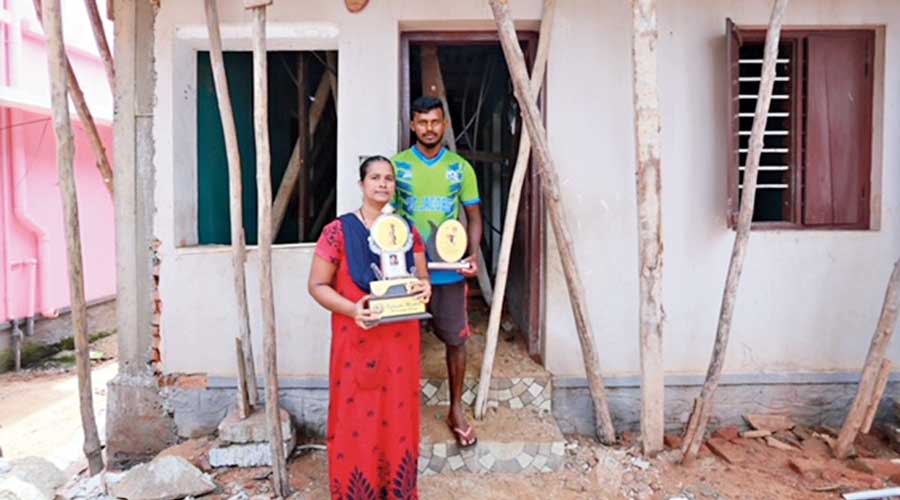Global warming has helped pave Alex Antony’s path to the Tokyo Olympics.
Now the 26-year-old member of India’s mixed 4x400m relay team hopes his accomplishment would help highlight the misery his fishing community in Kerala has suffered from global warming, made worse by the human hand.
Alex was just a boy when climate change inflicted its first wound on him. Born to an impoverished fishing family at Pulluvila on Thiruvananthapuram’s outskirts, Alex’s burning ambition was to become a footballer.
He would play all day on the Irayimman Thura Purayidam beach that made up his front yard, and practise running every morning and evening.
But by the time he was 10, “accretion” of the beach — the accumulation of a kind of sediment — had turned it into a vast, soggy area unfit for football. Alex’s dreams were wrecked.
“I was crazy about football and it was extremely painful. But my teacher (at the PKS Higher Secondary School, Kadinamkulam) boosted my morale and convinced me about the possibilities of athletics,” Alex said.
A. Bijukumar, ocean expert and head of the department of aquatic biology and fisheries at the University of Kerala, explained that these sediments were rocks, soil, clay and sand from other shores and beaches.
The sea erodes its shores during some months, especially the turbulent monsoon months, and returns the same volume of sediment to the same shore after a few months.
But global warming as well as breakwaters or any other huge constructions in the sea can alter the wind and wave patterns and cause the sediments to be deposited in other parts.
In Thiruvananthapuram, sea erosion is happening north of Vizhinjam and accretion in Pulluvila to the south. The accretion increased after the construction of a 600m breakwater at the Vizhinjam fishing harbour, 7km north of Pulluvila. It worsened when about 800m of the proposed 3,000m breakwater of the Adani International Sea Port project came up in Vizhinjam.
The accretion raised the edge of the Pulluvila beach by about 40 metres, preventing rainwater from flowing into the sea and turning the area swampy.
It did not just stop Alex from playing football; the huge pools of accumulated water prevented the mooring of boats and the drying of fishing nets. The elevation of the beach made it difficult for the 600 fishing families to put their boats out to sea.
Alex’s father Antony and younger brother Anil shifted their fishing operations to the Chettuva fishing harbour in Thrissur district, 287km away. The duo took turns to travel to Chettuva to keep the home fires burning.
While poverty forced Anil to drop out of school and start helping his father, Alex continued his education at the Lio XIIIth Upper Primary School at Pulluvila and then at the Kadinamkulam school.
There, physical education teacher Pradip handed Alex a pair of boots and a tracksuit and advised him to focus on athletics, using the school ground for practice. It changed the boy’s life.
“We feel guilty for never being able to meet any of his training needs. His teachers helped him emotionally and financially,” Alex’s mother Sarjin, who dries small fish in the sun to buttress the family income, said.
“He discontinued his degree course at the Sree Narayana College in Chempazhanthy in the second year because we could not meet the expenses. It was then that Sports Authority of India coach Nishad Kumar realised his potential and began training him.”
Alex’s sports quota job with the Indian Air Force in Punjab came as a big respite for the family. His sister Anisha was married off recently.
“Alex and his family have been bearing the brunt of climate change for a long time. Cyclone Tauktae, which devastated Kerala’s coasts in May, caused his small, old house to collapse,” said Joseph Vijayan, a scholar and a defender of coastal communities’ rights in the Thiruvananthapuram region.
“Now the family lives in a relative’s house. Alex has taken a bank loan to renovate the badly damaged house.”
Vijayan said about 65 per cent of Kerala’s coastline was eroded and 25 per cent faced accretion. Sandy beaches, which make up more than 90 per cent of Kerala’s 580km coastline, are more prone to erosion and accretion.
Port areas in other states, including eastern Paradip in Odisha, too are facing accretion. But in Kerala, the unscientific construction of huge breakwaters and sea walls has aggravated the situation.
Experts say erosion has increased to the north of the Rs 7,525-crore seaport being built by Adani and accretion to its south.
K.V. Thomas, a scientist with the National Centre for Earth Science Studies, said the erosion-accretion in the Vizhinjam region would worsen, even posing challenges to the local airport and the Indian Space Research Organisation establishments in Veli and Thumba, because of the constructions related to the port.
“Unfortunately, neither the environmental nor livelihood impacts of the project have been assessed sufficiently or accurately. The port is irresponsibly situated in the erosion-prone coast of Thiruvananthapuram,” Thomas said.
“Several studies say the Vizhinjam coastline is not geared to withstand the potential impacts of the construction and operation of the mega port.”
As for Alex, he could never hope to be an Olympian, surely, had the accretion not forced him off football and into athletics?
“Yes, it was a blessing in disguise. I never thought I would represent my motherland in the Olympics,” Alex, speaking from Punjab, said.
“It’s a matter of pride as I come from a family that experienced impoverishment at regular intervals. More than my future and career, I hope this opportunity helps me improve the conditions of my family.”
But Alex has a bigger concern too. “My village faces an existential crisis. I hope my participation in the Olympics helps put a larger spotlight on the problems of fish workers south of Vizhinjam.”











